Deep Integration of E-Commerce and Characteristic Agricultural Products in Longnan Drives Sustainable Development – Rural, Poverty-Stricken Areas in the City Find a New Path
p.china.org.cn,November 16, 2020 Adjust font size:
Abstract
Many poverty-stricken areas in China produce rich, high-quality agricultural products, but it is not always easy for growers to profit from them. Transportation and distribution can be difficult, information can be limited, and there can be a lack of sales channels. E-commerce platforms have been created and harnessed in the city of Longnan to coordinate flows of manpower, commodities and information and have leveraged local resources to foster economic growth. They make it possible for agricultural products grown in local impoverished villages to end up on dinner tables in large cities and for people to increase their incomes and escape from poverty.
Background
Longnan is located in southeast Gansu Province. It covers 27,900 sq km and has a population of 2.87 million people. The city has one urban district, four sub-districts, and eight counties. There are one hundred ninety-five townships and 3,201 administrative villages within its borders. Longnan has a good natural environment and an abundance of resources, and its agricultural products enjoy a favorable reputation. Many high-quality products are produced, such as olives, Sichuan peppers, walnuts, apples, Chinese herbs, black fungus and honey.
Longnan is part of the contiguous destitute area in the Qinling-Daba Mountains region. The city updated its poverty records in 2013, and about 839,400 people were found to be impoverished, or 34.1 percent of the total population, and 1,707 of its villages were found to be poverty-stricken. Its rural population was found to have US$524 (RMB3,536) of disposable income per capita. Longnan had the largest impoverished population and highest poverty rate in Gansu Province at the time.
The rugged, mountainous area that Longnan is located in, inconvenient transportation in many of its localities, and often-limited information in its rural areas caused many difficulties in the past. The city’s villagers had common problems in selling their produce, which were little known to people in other areas. This severely restricted their incomes. China’s Internet Plus initiative, which is a national strategy that involves using the internet to modernize and enhance various industries, was harnessed at the end of 2013 and began to change the situation. Rural e-commerce underwent intensive development at this time. E-commerce platforms, new media marketing on social media platforms such as WeChat and Weibo, and other avenues were pursued to promote agricultural products and increase villagers’ incomes. E-commerce has effectively addressed difficulties with sales that people involved with the production of agricultural products had experienced and has greatly decreased poverty.
Interventions
At the beginning of 2015, the State Council Leading Group Office of Poverty Alleviation and Development approved Longnan’s application to become the first pilot city for poverty alleviation via e-commerce in China. Six initiatives were implemented that pertained to the creation of online stores, impoverished households functioning as suppliers for e-commerce enterprises, entrepreneurship, employment in the e-commerce industry, the development of a shareholder system for people involved with e-commerce, and e-commerce crowdfunding, respectively. Poverty-alleviation via e-commerce started from scratch in Longnan and blossomed in just a few years. The city successfully transitioned from a national pilot city to a national model city in this regard. E-commerce has helped people living in Longnan’s poverty-stricken areas increase their incomes, and the city has become well-known for its efforts and outcomes.
1. The government accelerated the development of e-commerce by exercising its leadership role. Longnan implemented six powerful administrative initiatives to support the undertaking and create a favorable environment for it. The measures helped to rapidly enhance the reputation and influence of the city’s characteristic products, make substantial breakthroughs in a relatively short period of time, and eliminate poverty.
First, specific bureaus were established to shoulder various responsibilities. China’s first city-level e-commerce development office was created; e-commerce centers were formed in counties and townships. Hence administrative promotional systems were established at the city, county, and township levels. The performance of poverty alleviation efforts related to e-commerce became an important part of Party and government assessments at all levels, and a reverse accountability system was formed. These efforts helped accelerate the development of e-commerce and focus poverty alleviation pursuits.
Second, policy measures were formulated to stipulate how progress should be pursued. A series of documents, such as “Opinions on How to Promote E-Commerce and Achieve Concentrated Breakthroughs” and “Implementation Opinions for the Poverty Alleviation via E-commerce Pilot Project,” were issued to support the undertaking. Dedicated funds were established at the city and county levels for the purpose of providing financial support to e-commerce poverty alleviation endeavors, such as subsidies and various rewards. Every household that was interested in establishing an online store was offered US$1,483 (RMB10,000), which was an important aspect of funding in the initial stages of e-commerce development.
Third, grassroots officials took on e-commerce leadership roles in poverty-stricken villages. Lack of leadership can be one of the biggest problems when pursuing e-commerce in these kinds of areas. Village officials and other grassroots officials provided information about how to obtain internet access and create online stores, which helped Longnan’s poverty-stricken population participate in e-commerce.
Fourth, e-commerce training was provided so that people could work for e-commerce businesses. The “Guideline on E-Commerce Business Training” was formulated, and the Longnan E-Commerce Vocational and Technical College was later established and became the first e-commerce school in northwest China. Training was carried out at multiple levels in a targeted manner every year according to demand. A team of professional lecturers who are devoted to poverty alleviation through e-commerce was established to improve standards and training quality. E-commerce became an important part of the training that government officials receive at all levels as well. At least one qualified instructor who is knowledgeable about e-commerce platforms was made available in every village so that comprehensive instruction that covers areas such as agriculture technology, production and processing of commodities that are sold online, and online marketing and promotion could be carried out. E-commerce training institutions and leading e-commerce enterprises from Longnan and other areas had helped about 250,000 people learn about various aspects of the industry as of June 2019.
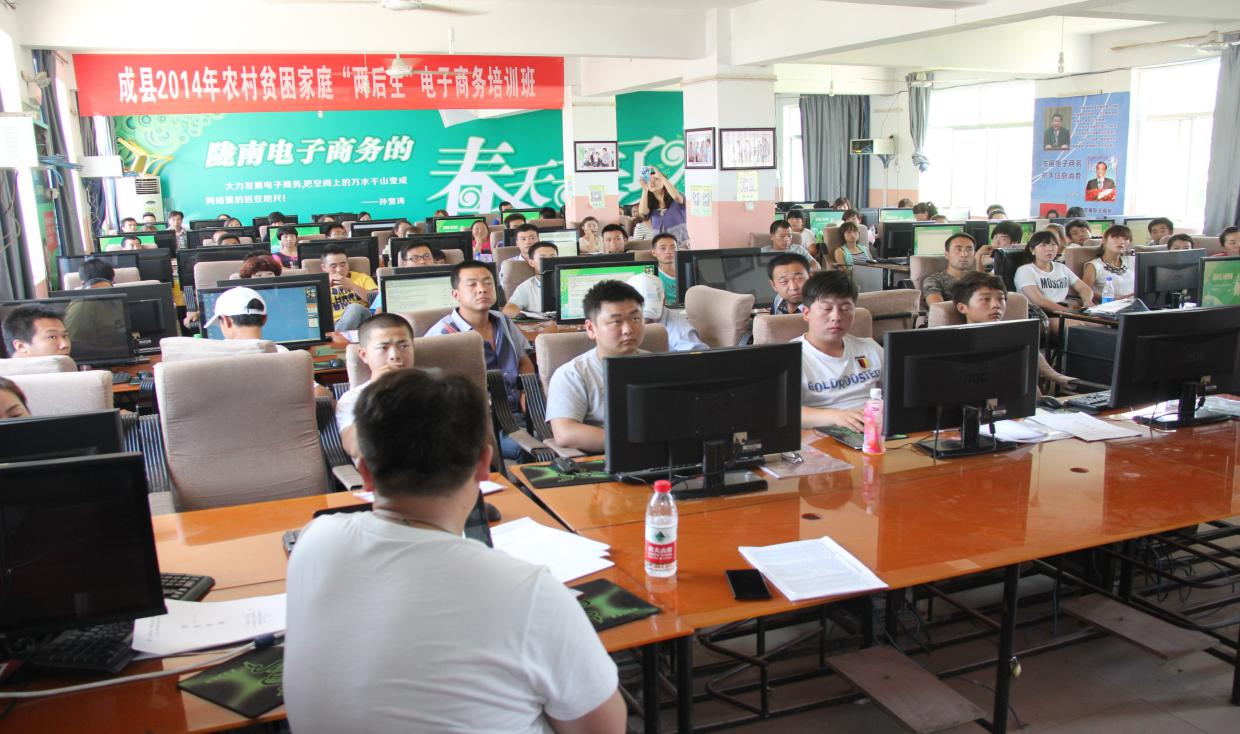
An e-commerce training program in Longnan
Fifth, a marketing and publicity campaign was conducted to enhance awareness of Longnan’s characteristic agricultural products and e-commerce endeavors. The government has created 2,690 Weibo accounts, 949 WeChat accounts, and 385 websites related to the city’s e-commerce efforts. The vast community of village, township, county, and city officials in the city registered personal Weibo and WeChat accounts in order to form a social media matrix that would further promote Longnan’s characteristic agricultural products and e-commerce stores. QR codes were posted for the “Longnan Government Affairs” Weibo account and “Comprehensive Guide to Longnan’s Online Stores” throughout the city, and books such as “A Look at Longnan’s Poverty Alleviation via E-Commerce Efforts” were compiled. More than 4.5 million results related to the city’s e-commerce pursuits eventually appeared on the Baidu search engine, which helped to greatly improve the visibility of its characteristic agricultural products and e-commerce activities.
Sixth, integration with other platforms and endeavors was actively pursued. Various activities and events were organized to promote the city’s agricultural products and develop new sales channels. An article about tourism in the city called “Hey, Let’s Go to Longnan” garnered more than 130 million views. The Longnan E-Commerce All-Star E-Sports Tournament and Douyin’s Qiqiao Cup short video contest were held in 2018 and helped to thoroughly promote the city’s characteristic agricultural products. The second Longnan E-Commerce All-Star E-Sports Tournament was held in 2019 and attracted more than 60 million visitors online. Participating web merchants brought in more than US$1.364 million (RMB9.2 million) of revenue during the event.
2. Major e-commerce platforms were established for suppliers, online store operators, and service providers.
First, supplier platforms were established for commodities that are sold online. Green brands and environmentally-friendly qualities were highlighted, and quality control was strengthened. Characteristic agricultural products underwent intensive development, including traditional products that are abundant in the area, such as walnuts, Sichuan peppers, olives, Chinese herbs, tea, and apples, and guidance was provided regarding other products that sell well online, such as honey, small grains and embroidery. More than 90 supplier platforms had been established and over 1,200 products had been developed as of June 2019.
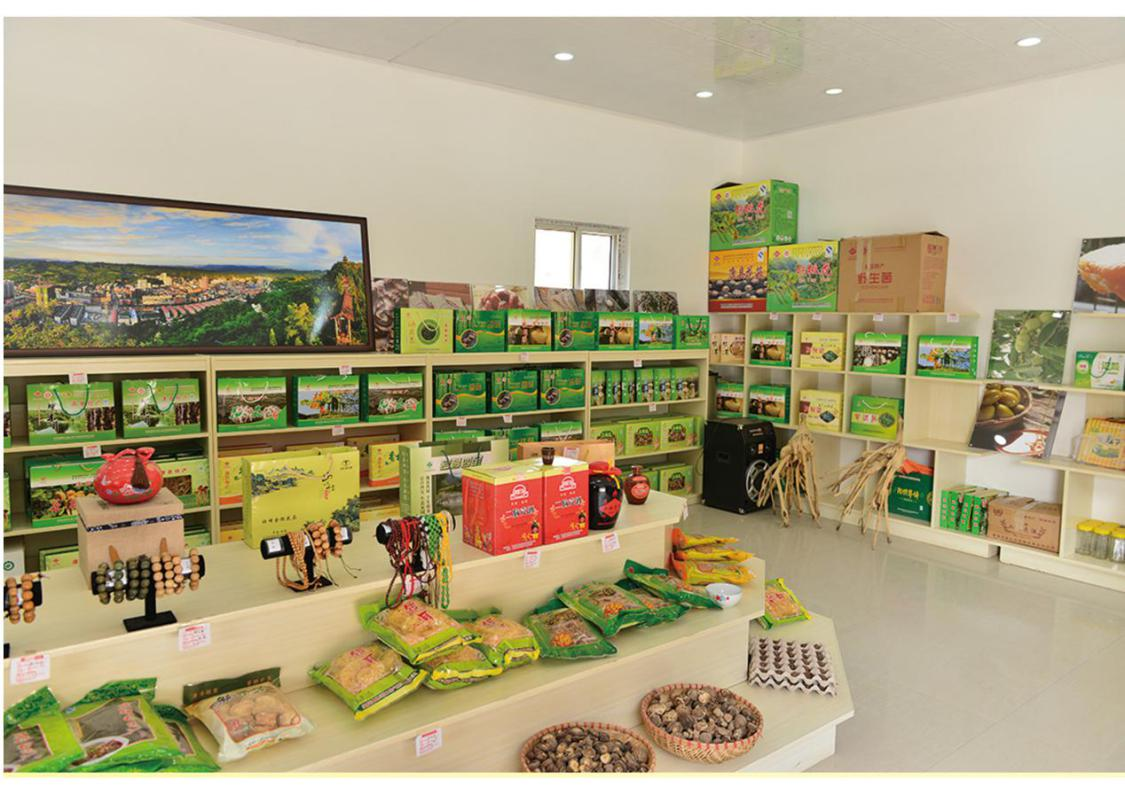
Products on display at Hui County’s poverty alleviation via e-commerce business center in Longnan
Second, cooperation was actively pursued with domestic e-commerce platforms and enterprises, and new e-commerce sales platforms were formed. “Longnan. China.taobao.com” was established and became the first city-level Taobao platform in northwest China. The “longnan.1688.com” platform was created on Alibaba. E-commerce enterprises such as Suning and JD.com implemented e-commerce projects in rural Longnan as well. Characteristic platforms, such as the Ant Fair and Rural Longnan Big Data project were formed, and e-commerce incubator parks, entrepreneurship parks, and industrial parks were independently developed. Three hundred twenty-seven e-commerce associations were established at the village, county, and municipal levels. They have helped e-commerce endeavors harness local resources and have created favorable conditions for joint sales and group development.
Third, basic infrastructure was strengthened, and logistics and distribution platforms were established. The Longnan government invested US$88.50 million (RMB590 million) in the construction of internet infrastructure in villages and ensured full broadband network coverage. More than 12,000 km of roads were constructed or repaired to ensure access to every village and open up the “last kilometer” of logistics and distribution access. A basic logistics and express service system was also established to ensure the availability of “logistics parks in counties, express delivery services in townships, and agencies in villages.” Two hundred fifty-five logistics enterprises, 1,062 express service stations, and 1,200 village postal service stations were developed and integrated. Government subsidies helped accelerate the construction of logistics systems and networks at the village, township, and county levels.
3. Six initiatives related to poverty alleviation via e-commerce were established to enhance and magnify its effects.
First, efforts were made to assist with the establishment of online stores. An initiative known as“one village, one store” was carried out in impoverished villages. It entails at least one online store being established in every poverty-stricken village to provide guidance and encourage capable households, village officials, and cooperatives to actively take part in the establishment of more online stores. Various rewards began to be offered as well, and they began to replace subsidies. The “one store for multiple households,” “one store for one village,” and “one store for multiple villages” models were formed and implemented. They involve integrating the interests of various parties by having impoverished households’ characteristic agricultural products sold through the stores. The 1,499 online stores that were established in poverty-stricken villages throughout Longnan helped 150,000 people increase their incomes and escape from poverty.
Second, the “e-commerce + enterprise + poverty-stricken household,” “cooperative + e-commerce + poverty-stricken household,” and “online store + poverty-stricken household” models were implemented. They helped impoverished households become suppliers for various e-commerce businesses. Long-term cooperation agreements that involve e-commerce enterprises purchasing standardized products at prices that are slightly higher than market rates were formed. Wen County’s Renhe Agricultural Products Co., Ltd. is one of the businesses involved in these agreements. It began placing purchase orders with impoverished villages in the county. Villages such as Jianhua, Fengpo, and Yangjiashan supplied 320,000 kg of Chinese herbs and 60,000 kg of Sichuan peppers in 2018 alone.
Third, an e-commerce entrepreneurship system was established. Poverty-stricken households with a certain level of entrepreneurial ability, young people from Longnan who had been living elsewhere and had returned to the area, university graduates who had not yet found employment, and disabled people were encouraged to engage in e-commerce entrepreneurship and provided with guidance and support. More than 18,000 people engaged in “mass e-commerce entrepreneurship and innovation” throughout the city, including 285 people from impoverished households who launched their own online stores.
Fourth, an e-commerce industry chain was formed that includes production, processing, packaging, logistics, and marketing and has resulted in many employment opportunities for impoverished people. Poverty-stricken households can engage in all aspects of the e-commerce industry via a flexible employment system that allows them to participate when they are not busy with agricultural work. E-commerce enterprises, cooperatives, and online stores pay impoverished people by the hour or by volume. More than 220,000 people have participated as of June 2019, and they make more than US$15 (RMB100) a day on average.
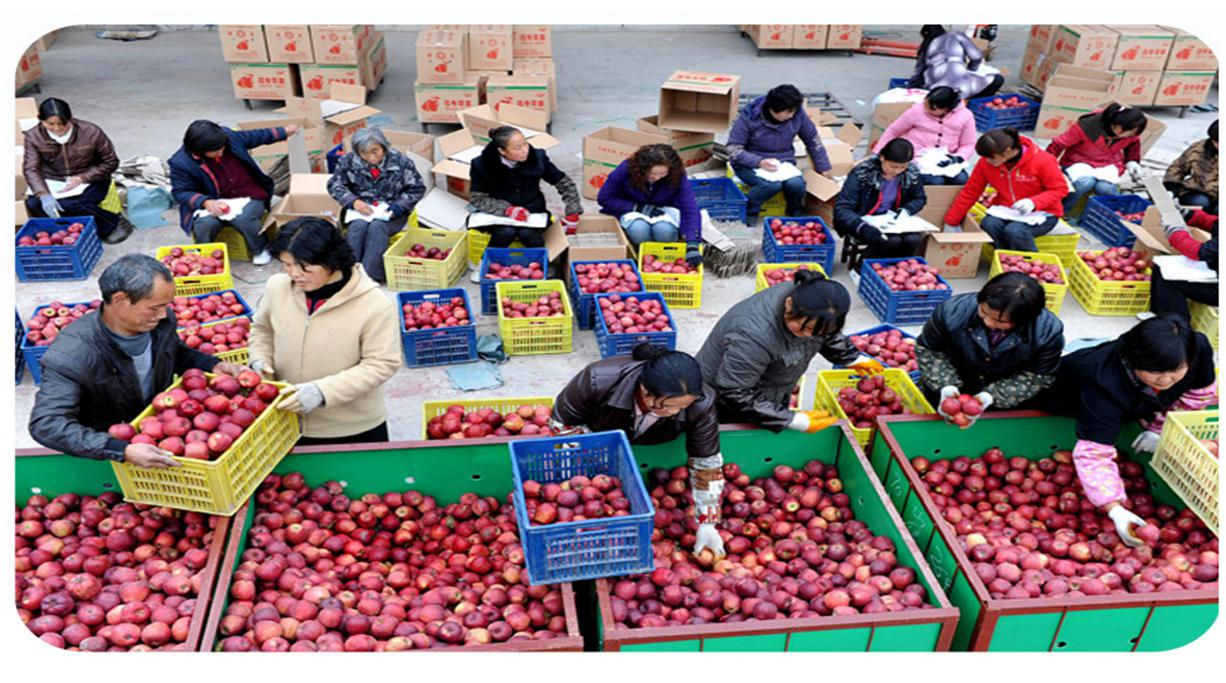
Some of Longnan’s rural citizens package apples at a Liangyuan E-commerce Co., Ltd facility in Li County.
Fifth, an e-commerce shareholder system was created. Poverty-stricken households without entrepreneurial abilities were encouraged to invest land, idle cash, and poverty alleviation funding into farmers’ cooperatives and other enterprises, which would allow them to receive regular dividends and increase their incomes. The Liangyuan E-Commerce Co., Ltd in Li County is a good example of a business that implemented such a system. It pays 10 percent of the US$7,416 (RMB50,000) that each of 40 poverty-stricken households provided back to them in the form of a yearly dividend.
Sixth, an e-commerce crowdfunding system was established. The stories behind various products were told, and presales were conducted. Poverty alleviation crowdfunding competitions were held throughout Longnan and helped motivate impoverished households. More than 500 projects were developed, and 60,000 people participated, which resulted in more than US$1.78 million (RMB12 million) of revenue. The “Longnan Agricultural Crowdfunding Competitions Assisting Poverty Alleviation” case study was selected for inclusion in “The Big Country’s Fight Against Poverty – Determining the Best Targeted Poverty Alleviation Models in 2020” forum by the People’s Daily newspaper and the China Foundation for Poverty Alleviation and chosen as a recommended case study.
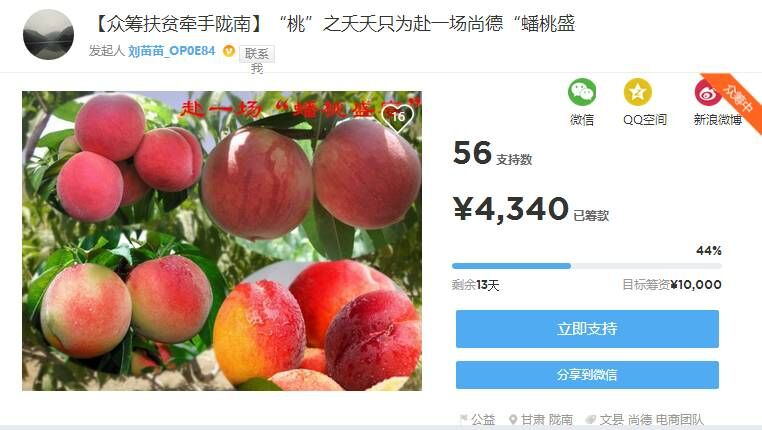
A crowdfunding project that was involved in one of Longnan’s e-commerce competitions
Results
By June 2019, over 14,000 online stores had been launched in Longnan, and e-commerce projects had logged more than US$2.08 billion (RMB14 billion) worth of revenue. The “Longnan Poverty Alleviation via E-Commerce Model” was selected for inclusion in the “National E-Commerce Poverty Alleviation Case Study Collection (2018)” and is considered a quintessential case. It also won the “2015 China Poverty Eradication Innovation Award” and “2018 China Smart Agriculture Conference Special Award.” Longnan was recognized as a “Model City for Poverty Alleviation via E-commerce” and “2018 National Top Ten City in Targeted Poverty Alleviation Innovation.” Representatives from dozens of national ministries and commissions and more than 1,000 delegations from 20 cities and provinces have visited the city to learn about its success with poverty alleviation via e-commerce.
1. E-commerce has been an efficient method of addressing poverty. Development vitality was strengthened in impoverished villages, poverty alleviation pursuits were scaled up and accelerated, and complementary infrastructure and public services were enhanced. Road networks and internet coverage were expanded, which improved logistics, boosted the sale of agricultural products, and improved the business environment in villages. High-quality agricultural products that poverty-stricken villages produce were sold online at favorable prices, which led to a direct increase in people’s incomes, and a flexible employment system that allows impoverished households to participate in the e-commerce industry when they are not busy with agricultural work was implemented. Poverty-stricken people have been able to effectively increase their incomes by working with e-commerce enterprises, cooperatives, and online stores. Earnings that Longnan’s impoverished population derived from e-commerce almost doubled from US$64 (RMB430) per capita in 2015 to US$124 (RMB810) in2018. The city’s poverty-stricken population decreased from 643,700 people in 2015 to 184,300 at the end of 2018, a total of 934 of its villages are no longer considered impoverished, and annual disposable income in rural areas increased from US$802 (RMB5,405) per capita to US$1,040 (RMB7,012), or almost 30 percent, during this period.
2. E-commerce has helped transform poverty-stricken people’s views and beliefs. New sales channels with low overhead have been pursued, marketing campaigns have been engaged in, and local products have been integrated with the national market. E-commerce pursuits related to poverty alleviation have promoted internet-oriented thinking and the concept of self-development. Rural residents and agricultural cooperatives have been able to transform into web merchants and enrich themselves through e-commerce. Some people who once worked as farmers began working purely in e-commerce, which contributed to poverty-stricken areas becoming much more productive.
3. E-commerce entrepreneurship began to bloom in Longnan. Business-oriented people from the city who were living and working elsewhere began to become interested in its e-commerce boom and return to the area to launch companies. Alibaba’s Rural E-commerce Project in Thousands of Counties and Villages was implemented for the first time in northwest China in Longnan’s Wudu District and Cheng County. The JD.com Bang Service Store and Suning Cloud Rural Merchant E-Commerce Project were also launched in the city. The Longnan E-Commerce Industrial Incubation Park began to thrive and was listed among China’s second group of e-commerce demonstration bases. Full coverage of the National Comprehensive Model County Project for Introducing E-Commerce in Villages was achieved throughout the city. These projects have provided broad space for employment for people with technical expertise and university graduates from Longnan who have returned to the area. Learning how to access the internet and use it in an economically productive manner became a new trend in the city’s villages. Young people from the area, including new university graduates, began to return to their hometown and launch online stores and compete in entrepreneurial contests with other capable villagers. More than 18,000 people have engaged in “mass e-commerce entrepreneurship and innovation” throughout the city, including 285 members of poverty-stricken households who have launched their own online stores.
4. Poverty alleviation initiatives have brought about adjustments to the agricultural industry structure in Longnan. The production process has become more environmentally-friendly, processing has become standardized, distribution has become modernized, and other modifications have occurred. Structural adjustments have been made to the supply side of the agricultural industry in poverty-stricken areas; agricultural industrialization has accelerated; economic growth models have been transformed in rural areas; restrictions related to geographical location, distribution, and other factors have been overcome; and the overall competitiveness of the agriculture industry and rural economy have been effectively enhanced.
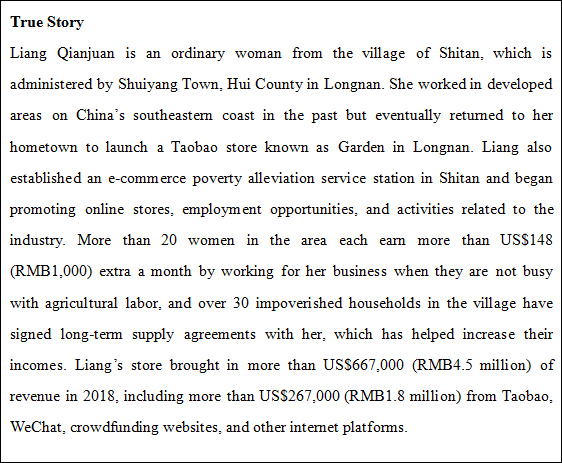
Lessons Learned
First, mental transformation can be an important part of pursuing e-commerce for poverty alleviation purposes. E-commerce has helped alter the mindsets of Longnan’s public officials and general population. The city is located in a remote, impoverished region, but the towering mountains in the area no longer separate its rural areas from the broader economy or limit growth in people’s mindsets. Longnan’s villagers have altered many of their ideas and gained a good understanding of the opportunities that are available to them.
Second, government can help advance the development of e-commerce. It has improved basic infrastructure in Longnan’s impoverished villages, assisted with solidifying the foundations of e-commerce, and assisted with the resolution of problems when they arise. The government has been an important part of the smooth implementation of e-commerce in poverty-stricken areas.
Third, creating a distinct brand is important, and providing a steady stream of high-quality products can enable e-commerce endeavors’ sustained development. Characteristic agricultural products from Longnan, products that sell well online, have been pursued. The city has implemented an initiative known as “three kinds of products with unified standards,” which refers to emission-free products, organic products, and green products being certified according to consistent standards. More than 220 of the products that are sold online have received these designations as of June 2019. E-commerce has experienced stable and sustainable development in the city, and a healthy industry chain has formed.
Fourth, forming a strong poverty alleviation foundation is important. Six initiatives were implemented for this purpose. They have effectively increased people’s incomes, promoted sustainability in impoverished villages and for impoverished people, enhanced and consolidated poverty reduction efforts, and greatly improved people’s confidence in e-commerce and agricultural development. E-commerce has connected the high-quality products that are produced in Longnan with external markets in a targeted manner; stimulated innovation and entrepreneurship among young people and other groups; enhanced the influence of the city; improved the circulation of information; helped coordinate flows of manpower, commodities, and funding to address problems such as small scale, lack of competiveness, and low intensification of efforts in industry clusters; and rapidly created new growth points in the economy.